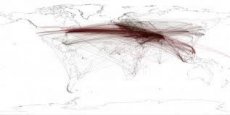New publications
Supercomputer can predict large-scale social events in the world
Last reviewed: 30.06.2025

All iLive content is medically reviewed or fact checked to ensure as much factual accuracy as possible.
We have strict sourcing guidelines and only link to reputable media sites, academic research institutions and, whenever possible, medically peer reviewed studies. Note that the numbers in parentheses ([1], [2], etc.) are clickable links to these studies.
If you feel that any of our content is inaccurate, out-of-date, or otherwise questionable, please select it and press Ctrl + Enter.

The supercomputer is capable of predicting major events on the world stage based on the analysis of news reports.
That's the conclusion of a study authored by Kalev Leetaru, a researcher at the Institute for Computing in the Humanities and Social Science at the University of Illinois.
He set up an experiment in which a supercomputer analyzed millions of newspaper articles and other reports and then produced predictions of changes in the public atmosphere in various countries around the world.
The system predicted changes in the situation in Libya and Egypt, and also recorded indications of the possible location of Osama bin Laden.
Although the system worked retrospectively, the scientist believes that it could easily be used to predict future conflicts.
"Nautilus" gives a forecast
The information fed into the SGI Altix computer known as "Nautilus" at the University of Tennessee was taken from a range of sources, including BBC Monitoring Service reports.
News agency reports were also analyzed, as well as the New York Times archive dating back to 1946.
In total, Kalev Leetaru used more than 100 million articles.
They were analyzed according to two parameters: sentiment - whether the article reported bad or good news, and the location where the events took place.
The key words in the first case were "horrible," "disgusting," "excellent." The location analysis, or "geocoding," took into account references to place names, such as Cairo, and plotted them as coordinates on a world map.
An analysis of message elements was also conducted, which resulted in a map of 100 trillion logical relationships.
The Nautilus supercomputer, which is based on 1004 Intel Nehalem-type core processors, is capable of performing 8.2 trillion operations per second.
He produced different graphs for each of the countries where the so-called "Arab Spring" took place.
In each case, the computer recorded a noticeable deterioration in the public atmosphere before the outbreak of unrest, both within the country and abroad.
In Egypt's case, a month before Hosni Mubarak's resignation, public discontent reached a level seen only twice in the past 30 years.
According to Leetaru, his system produces more accurate forecasts of the development of the social situation than the forecasts that were then prepared by American intelligence agencies for the US government.
"The fact that the US president spoke in support of Mubarak shows that even the highest level analysis indicated that Mubarak would remain in power," Kalev Leetaru said. "This is probably because such analysis is being done by experts who have spent 30 years studying Egypt, and for 30 years nothing has happened to Mubarak."
Similar changes in public sentiment were noted retrospectively by the computer in the case of Libya and the Balkan conflicts in the 1990s.
In Search of Bin Laden
In his article, Kalev Leetaru suggests that such an analysis of all information about Osama bin Laden could provide clues to his whereabouts.
Although many believed the al-Qaeda leader was in Afghanistan, geographic data from news sources consistently pointed to his location in northern Pakistan.
Only one report mentioned the city of Abbottabad, where bin Laden was hiding.
However, geocoding using the Nautilus computer narrowed the search area to 200 km.
Dr. Leetaru says his system is very similar in principle to existing algorithms for predicting changes in stock markets.
It is easily adapted to analyze future events and is capable of working in real time.
"The next stage will be testing the system at the city level in order to study the interaction of different population groups," the scientist said.
 [ 1 ]
[ 1 ]
